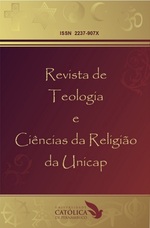FRANCISCO JULIÃO'S BIBLICAL INTERPRETATION IN THE SUGARCANE FIELDS
DOI:
https://doi.org/10.25247/paralellus.2021.v12n30.p487-505Keywords:
Socialism, Peasant Leagues, HermeneuticsAbstract
The article intends to highlight an admittedly complex issue. It is about the hermeneutics of the Bible made by an activist of socialist inspiration, declared an atheist and legal advisor to the Peasant Leagues. Initially, an effort is made to clarify the possibilities of understanding the meaning of the term hermeneutics. Then, an attempt is made to delimit what is the perspective of understanding socialism. In third place, we consider Francisco Julião's role in the Peasant Leagues, which, in addition to his functions as a legal advisor, assumes the role of educator in the development of awareness of the reality experienced by peasants in the land work and in the cultivation of sugarcane. In order to promote a new way of evaluating his own circumstance and finding alternatives for his life experience marked by the suffering arising from working conditions that resulted in a situation of misery and oppression, he resorted to the interpretation of the Bible that revealed an experience similar to which was experienced by the workers at that time and presented the intervention of God as a liberating action from the situation of misery and oppression and the offer of a “land where milk and honey flowed”. As a connoisseur of the peasant dynamics of the state, he perceived the three pillars in the daily life of the rural man: religion, cachaça and henchmen. Based on this knowledge, he developed a training process aimed at transforming the reality of the lives of the people in terms of a new way of living in harmony with the will of God. The production of documents, the use of simple language and the effort to make the hermeneutics of biblical texts were in function of this great objective. In other words, Julião practiced a true hermeneutics of existence in terms of life itself that could be lived as an event collective with the smell of wet earth and the taste of sugarcane honey.
Downloads
References
BASTOS, Elide Rugai. As Ligas Camponesas. Petrópolis: Vozes, 1984.
BOBBIO, Noberto; MATTEUCCI, Nicola; PASQUINO, Gianfraco. Dicionário de Política I. 11 ed. Brasília: Editora Universidade de Brasília, 1998.
CARVALHO, Rafael de. Carta de alforria do camponês. Editora Jotapê, s.d.
HIGUET, Etienne Alfred. Hermenêutica da religião. p. 457-468. In: PASSOS, João Décio; USARSKI, Frank. (Orgs.). Compêndio de Ciências da Religião. São Paulo: Paulinas; Paulus, 2013.
HOORNEART, Eduardo et al. História da Igreja no Brasil: ensaio de interpretação a partir do povo. Primeira época. 2. ed. Petrópolis, RJ: Vozes, 1979.
IGREJA CATÓLICA. Catecismo da Igreja Católica: Edição Típica Vaticana. São Paulo: Loyola, 2000.
JULIÃO, Francisco. A Cartilha do Camponês. Recife: edição do autor, 1960.
JULIÃO, Francisco. Que são as ligas camponesas? Rio de Janeiro: Editora Civilização Brasileira, 1962.
JULIÃO, Francisco. Cambão: a face oculta do Brasil. Recife: Bagaço, 2009.
KOURY, Mauro Guilherme Pinheiro. Breve história do Movimento Camponês no Nordeste. Revista Raízes, Campina Grande, Ano II, n. 2-3, p. 167-175, 1983.
SCHMIDT, Lawrence K. Hermenêutica. Petrópolis: Vozes, 2012.
Downloads
Published
Issue
Section
License
Copyright (c) 2021 José Tadeu Batista de Souza, Ricardo Jorge Silveira Gomes

This work is licensed under a Creative Commons Attribution 4.0 International License.
A submissão de originais para a Paralellus implica a transferência, pelos autores, dos direitos de publicação eletrônica. Os direitos autorais para os artigos veiculados neste periódico são do autor; todavia, são da revista os direitos sobre a primeira publicação. Os autores somente poderão fazer uso dos mesmos resultados em outras publicações se indicarem, claramente, que a Paralellus foi o meio originalmente utilizado. Em decorrência do fato de ser a Paralellus uma revista de acesso público, é permitida a utilização gratuita dos artigos em aplicações educacionais e/ou científicas não comerciais, desde que respeitando-se a exigência de citação da fonte (Texto atualizado em 16-11-2020).


















